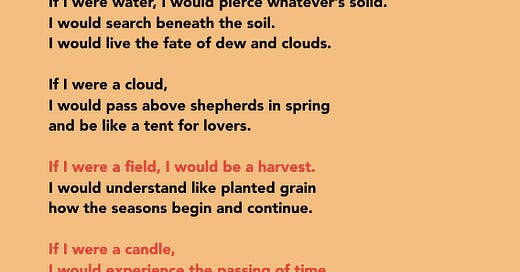Adonis was born Ali Ahmed Said in the village of Al Qassabin in Syria, in 1930, to a family of farmers, the oldest of six children. At the age of nineteen, he adopted the name Adonis (also spelled Adunis), after the Greek god of fertility, with the hopes that the new name would result in newspaper publication of his poems.
It is a difficult task to find a single representation from Adonis’s body of work. His poetry is the direct consequence of a life of churning - philosophical engagement with an Arab world in conflict, a questioning of the relationship between theology, faith and politics, and the creation of a new idiom of Arabic poetry. When I first read his poetry from “If only the sea could sleep”, it was a revelation. I could not believe the ease with which he mixed metaphors and relentlessly dug at the soul with words at the tips of his muddied fingernails.
It felt as if Adonis sat in a different world, an infinite expanse of nature, history and myth, that he nonchanantly plucked from as was his fancy. The power of his imagery is compounded with formal intricacy that lends to a careful uncovering of meaning that grows on the reader even after several readings.
Talking about his love for the “fragment”- the breaking down of long musings and observations into lyric capsules ensconced in sense, rhythm, metrical flair and colour, he outlines the basis for his innovation.
"I wanted to draw on Arab tradition and mythology without being tied to it,” adding, “I wanted to break the linearity of poetic text — to mess with it, if you will. The poem is meant to be a network rather than a single rope of thought.”
I would like to visit Adonis again and again, and share his writing with you. His verse and scholarship, and carving out of new terrains in philosophy make a fresh case on what it means to be human, and how one engages with the question of faith in a world gone mad. The paradox of being enmeshed within human flesh, being subject to human desire, and yet recognising the possibilities of exquisite creation drives a universal plea:
I love what I am and hate my love for it
Is there another way I can create this world?







